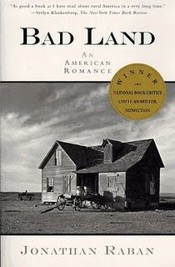Bad Land: An American Romance

This is a book about a place. Not the Badlands of South Dakota (which I initially thought), but the “bad land” of Eastern Montana. It’s the story of immigrants who settled there and claimed homesteads on the promise of dry farming techniques and decent weather.
But the weather was bad, and dry farming didn’t work nearly as well as they had been told. Banks lent them money, the weather turned dry, and everything went to hell. A huge wave of those that had come in went back out again. Then the Dust Bowl of the 30s hit, and most of the rest left too.
What was left was lingering suspicion of government, born of the idea that the railroad companies lured them there in the hopes of boosting profits, and did so through the Homestead Acts of the government, with which they were obviously in cahoots. It’s a classic conspiracy tale of business influencing politics at the expense of the common man, whether or not it’s true.
The author spent several years traveling around this land, and towards the end of the book, he heads further west toward his home in Seattle. As you go west, you find a lot of the militia and anti-government groups, and the book takes an interesting detour at Lincoln, where the Unabomber was eventually found (it wasn’t nearly the “wilderness” that the media claimed it was). You hear about Ruby Ridge, and sometime around when the book was written (1995), the bombing in Oklahoma City happens.
The book is languid. The author is in no hurry to get anywhere. The prose is lyrical (sometimes overly so), and the author is doesn’t tell you anything – instead he describes, and let’s you draw your own conclusions.
I’ve been out west of where I live (Sioux Falls), and there’s not much out there. West of Rapid City – or north, for that matter, prior to the Bakken oil boom – you find vast stretches of land, sparsely populated, uninviting, and occasionally populated by people you assume are just getting by.
In some senses, it feels like another country, in which people live that look like you, talk like you, but yet are very different than you.
Book Info
- I have read this book. According to my records, I completed it on .
- A softcover copy of this book is currently in my home library.